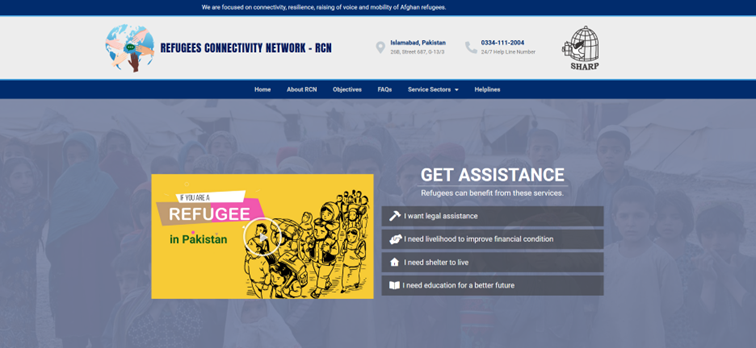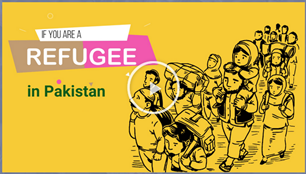Tool #2: Promoting connectivity - the Website
The Refugees Connectivity Network
Connections of all kinds are critical for refugees to thrive in new environments. Knowing whom to contact for what service is fundamental for refugees to take control over their lives. Hosting communities may offer support in connecting refugees to legal services, government programmes and existing networks. But this support is of little use to refugees if they are not aware of them.
What is the tool?
The RCN—Refugees Connectivity Network—responds to this gap. It is a pathfinder website (https://rcn.org.pk) for refugees and asylum seekers in Pakistan, created by the Society for Human Rights and Prisoner's Aid (SHARP) in Pakistan. It aims to steer refugees towards the services that are available to them in Pakistan.

The tool is simple:
It lists available service providers and their contact details in the legal, employment, housing and education sectors that support refugees. These providers become visible to refugees but also to one another, which helps with referrals and coordination among them.

A frequently asked questions (FAQ) page answers questions such as, “Who should refugees contact in times of need?” “How can refugees find their relatives in Pakistan?” Answers are provided in drop down text:

An introductory video guides users in navigating the website and finding contact numbers for critical services. The website is targeted towards refugees and asylum seekers in Pakistan. However, it should be used by practitioners from government and non-governmental organisations in Pakistan and diplomatic staff of refugee origin countries in Pakistan. Practitioners of international organisations (humanitarian or development) should also raise awareness of the RCN tool.
Creating your own tool
Any organisation can create a pathfinder website like the RCN for the country in which they operate. Users do not need fancy graphics or sophisticated applications—they need information and a one-stop-shop to get it.
The RCN took approximately three to five months to develop with a budget of 3,000 Euro. SHARP tested the website with refugees in Islamabad and sought feedback from partner organisations. The idea to develop the RCN came from requests from refugees for how and with whom to connect for support in navigating life in Pakistan.
Websites should be in the local language, English, but also the predominant languages of refugee origin countries. Creating a website is only the first step – the next step is to spread the word to the refugee community. SHARP informed refugees about the website during their daily activities such as Shura meetings, community awareness sessions, and visits to camps, not to mention via mobile chat groups such as WhatsApp.
Coordination among refugee service providers and timely information about them can help refugees establish the connections they need.
